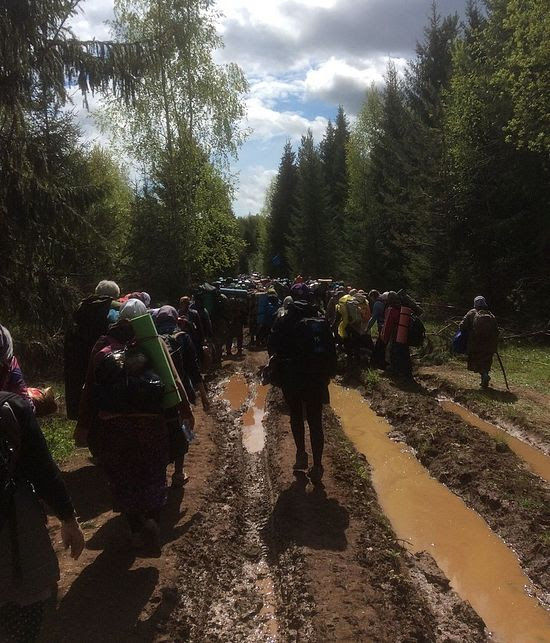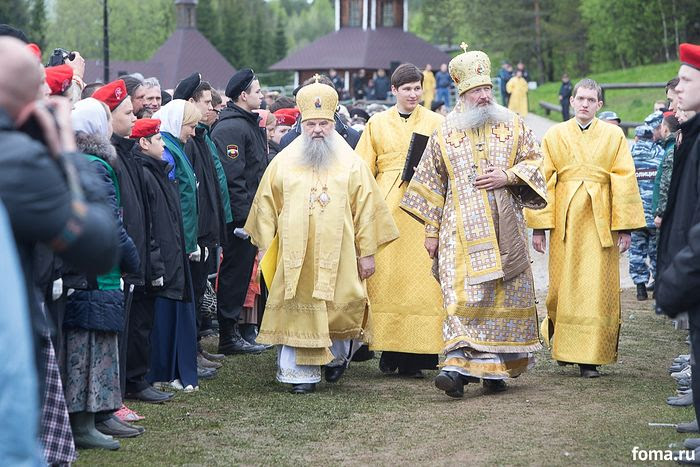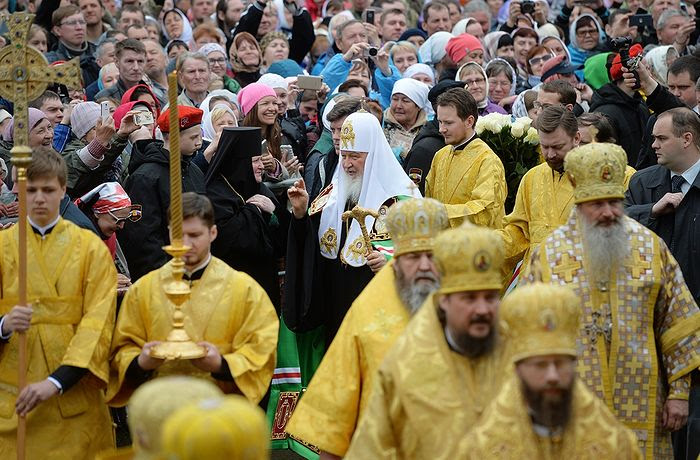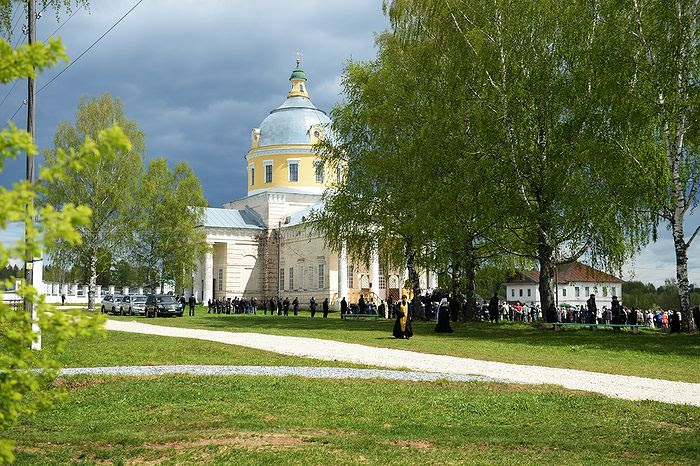RUSIA SAGVRADA ESPAÑA SAGRADA. EL COMPOSTELA RUSO ATRAE A MILES DE PEREGRINOS
ON RUSSIA’S HOLY ROAD

The anxiety had been mounting for weeks, and now over breakfast on the first day of the Velikoretsky pilgrimage there was no escaping the feeling that I may have made a terrible mistake. I had seen a Russia Today short programme about the oldest, longest, and largest walking pilgrimage in Russia, how, although very much suppressed in soviet times, it was not only allowed, but now hugely popular. An inner feeling had developed that I wanted to experience this event and to be a small part of the religious revival in Orthodox Russia.

So, visas obtained, injections endured, and all manner of unaccustomed items bought—a rucksack, sleeping mat and foam-roll, and (I thought they might be useful) many packets of Kendal’s Mint Cake. Anyway, now, on this first morning there was no way out so we went, as arranged to the entrance of the Trifonov Monastery in Kirov where the procession was about to begin. 105 miles to go, in a six-day round trip.

Already the choir was singing the end of the Liturgy, and hundreds and hundreds of people were arriving—every minute more and more until, through the archway colourful banners, priests and the wonderworking icon of St. Nicholas proceeded off down the road. We had been adopted by Anastasia who was the English teacher to students at the seminary “you have a blessing to walk with us at the front” she had told me and then we jumped in to the huge stream on people as the choir continued to sing. In fact, the choir sang all week from three o’clock in the morning until we stopped in the evening—through the streets, the fields and the forests as we walked—all ages, all types of people, men, women, and children, priests and monks, nuns.

Many pilgrims wearing icons round their necks, some walking barefoot.
 Photo: Alexander Groves
Photo: Alexander Groves
So the pattern was established—we walked for about two hours, then the icon stopped, a moleben sung, and thousands of people found a patch of field to unroll their mats, lie down for a rest and perhaps have some tea or a snack, then on out into the countryside and road which gave way to a path, and the path to mud and the mud to large path-blocking puddles.
 Photo: Julia Makoveychuk / Foma.ru
Photo: Julia Makoveychuk / Foma.ru
The miraculous icon was found in the forest by the river Velikaya in 1383 by a peasant who saw it bathed in light as if surrounded by many candles. A small chapel was built, miracles wrought and pilgrims started to seek the aid of St. Nicholas. When the icon was later moved to the monastery in the regional capital of Kirov, it was on the understanding that each year at the beginning of June it would return once again to where it was found. Under communism the pilgrimage was officially banned and as late as the Khrushchev period anyone in even the smallest group of walkers heading there was turned back.

By the year 2000, the full route of the ancient pilgrimage was allowed, and now some 40,000 people walk and pray and sing and do so with what I can only describe as a deep sense of joyfulness.

So, by the end of day one we arrived in a small village called Bobino with a chapel and a school floor where we were taken in to have a meal of buckwheat porridge and vegetables and tea and a very early night spent comfortably enough in my sleeping bag on the floor.
 Photo: Alexander Groves
Photo: Alexander Groves
“Wonderful news,” Arkady the student said to me, “you have a blessing to carry one of the banners—put this on,” as he handed me a sticharion at 3 AM the next morning.
So there I was, a strange Englishman walking at the front of the procession, carrying a banner of the Saviour through Holy Russia. After three days on the march we arrived at the river where the icon was discovered where a festive array of stalls selling things to eat and souvenirs to buy stretched from the monastery church towards the bank of the river. The usual huge vats of buckwheat porridge were available for the pilgrims and at 10 AM the Patriarch arrived to celebrate the Liturgy in an outdoor pavilion. After lunch—a bath in the river, and a relaxed afternoon. Then at 2 AM the following morning, after a service in the Church, we were heading back.
 Photo: Julia Makoveychuk / Foma.ru
Photo: Julia Makoveychuk / Foma.ru Photo: Julia Makoveychuk / Foma.ru
Photo: Julia Makoveychuk / Foma.ru Photo: Julia Makoveychuk / Foma.ru
Photo: Julia Makoveychuk / Foma.ru Photo: Julia Makoveychuk / Foma.ru
Photo: Julia Makoveychuk / Foma.ru Photo: Julia Makoveychuk / Foma.ru
Photo: Julia Makoveychuk / Foma.ru Photo: Patriarchia.ru
Photo: Patriarchia.ru
Two days later, in the gentle rain we walked back into the monastery at Kirov for the last service and tearful farewells to the strangers who had become friends.
 Photo: Patriarchia.ru
Photo: Patriarchia.ru
And after all my anxiety, and worry about my ability to walk that far, fear of not coping and the possibility of blisters?
 Photo: Patriarchia.ru
Photo: Patriarchia.ru
It was simply one of the most wonderful weeks of my life. Not only that I was moved by the devotion and love of the pilgrims, of their courage and deep happiness despite all the difficulties, but that something else had changed in me—a deep joyful realization that if my life of faith is a journey, then I am not traveling alone, but that supported and encouraged and loved even by people I scarcely knew, we are on this road together. Despite all life’s anxieties and frustrations, with prayer and even the smallest grain of faith, it will be alright. As I walked the last mile, glad that the rain was disguising my tears, I felt triumphant and deeply thankful. I pray that I will remember this lesson as I go through the remainder of my journey. I pray also that I might return to walk Russia’s Holy Road again.
 Photo: Patriarchia.ru
Photo: Patriarchia.ru Photo: Patriarchia.ru
Photo: Patriarchia.ru
21 / 07 / 2017
SEE ALSO:

No hay comentarios:
Publicar un comentario